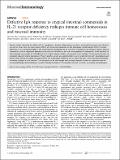Defective IgA response to atypical intestinal commensals in IL-21 receptor deficiency reshapes immune cell homeostasis and mucosal immunity
Author(s)
Cho, Hyeseon; Jaime, Henrique; de Oliveira, Rafael Pires; Kang, Byunghyun; Spolski, Rosanne; Vaziri, Tina; Myers, Timothy G.; Thovarai, Vishal; Shen, Zeli; Fox, James G.; Leonard, Warren J.; Kelsall, Brian L.; ... Show more Show less
DownloadPublished version (4.837Mb)
Terms of use
Metadata
Show full item recordAbstract
Despite studies indicating the effects of IL-21 signaling in intestinal inflammation, its roles in intestinal homeostasis and infection are not yet clear. Here, we report potent effects of commensal microbiota on the phenotypic manifestations of IL-21 receptor deficiency. IL-21 is produced highly in the small intestine and appears to be critical for mounting an IgA response against atypical commensals such as segmented filamentous bacteria and Helicobacter, but not to the majority of commensals. In the presence of these atypical commensals, IL-21R-deficient mice exhibit reduced numbers of germinal center and IgA⁺ B cells and expression of activation-induced cytidine deaminase in Peyer’s patches as well as a significant decrease in small intestine IgA⁺ plasmablasts and plasma cells, leading to higher bacterial burdens and subsequent expansion of Th17 and Treg cells. These microbiota-mediated secondary changes in turn enhance T cell responses to an oral antigen and strikingly dampen Citrobacter rodentium-induced immunopathology, demonstrating a complex interplay between IL-21-mediated mucosal immunity, microbiota, and pathogens.
Date issued
2018-08Department
Massachusetts Institute of Technology. Department of Biological Engineering; Massachusetts Institute of Technology. Division of Comparative MedicineJournal
Mucosal Immunology
Publisher
Springer Science and Business Media
Citation
Cho, Hyeseon et al. "Defective IgA response to atypical intestinal commensals in IL-21 receptor deficiency reshapes immune cell homeostasis and mucosal immunity." Mucosal Immunology 12 (August 2018): 85–96 © 2018 The Author(s)
Version: Final published version
ISSN
1933-0219
1935-3456